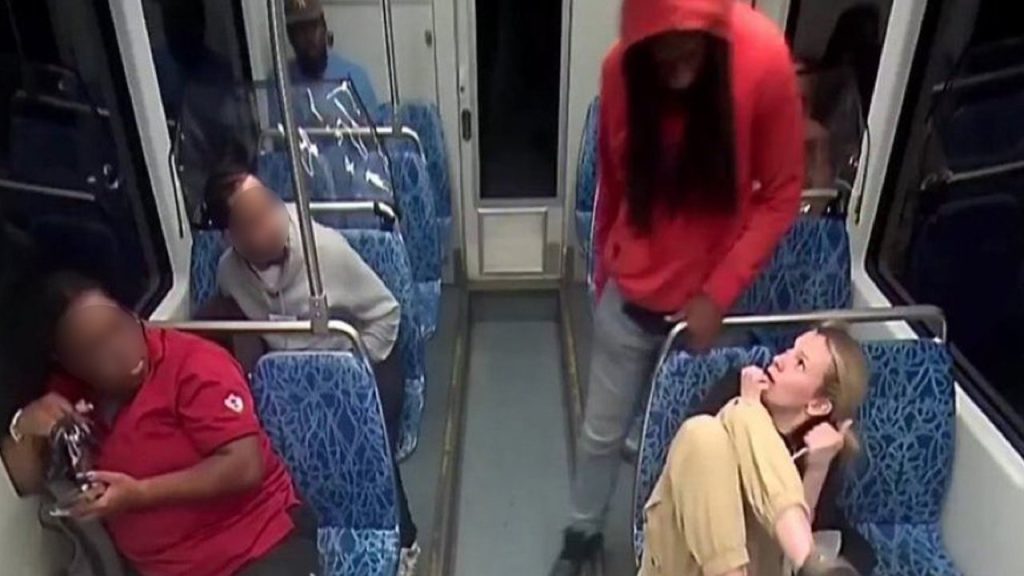The Tragic Phone Call: Inside the Mind of a Killer
In a disturbing revelation that has sent shockwaves through the Charlotte community, audio has emerged of a phone call between murder suspect Decarlos Brown and his sister Tracey, recorded just six days after the brutal stabbing of Ukrainian refugee Iryna Zarutska. The 34-year-old suspect, who allegedly killed the 23-year-old woman in an unprovoked attack on a light rail train, can be heard making chilling admissions about the crime while offering bizarre explanations for his actions. This conversation, which took place on August 28 and was provided to the Daily Mail by Brown’s sister, marks the first time the public has heard the suspect’s voice since the tragic incident that cut short the life of a young woman who had fled war in search of safety.
During the recorded call, Brown openly acknowledges injuring his hand while stabbing Zarutska, admitting that he had no prior connection to her whatsoever. “I hurt my hand, stabbing her. I don’t even know the lady,” Brown told his sister in a matter-of-fact tone that belies the gravity of his actions. “I never said not one word to the lady at all. That’s scary, ain’t it. Why would somebody stab somebody for no reason?” This admission is particularly haunting as it confirms the random nature of the attack against a woman who was simply commuting home in her pizzeria uniform after a day’s work. Surveillance footage from the train captured the terrifying final moments as Zarutska cowered in fear while her attacker approached.
What makes this case even more disturbing is Brown’s attempt to explain away his actions through bizarre conspiracy theories. Rather than accepting responsibility, he claimed that the government had implanted “materials” in his brain that were “controlling” his behavior. “They just lashed out on her, that’s what happened,” he told his sister when pressed about why he targeted Zarutska specifically. “Whoever was working the materials they lashed out on her. That’s all there is to it.” Brown insisted that investigators should examine these alleged implants, suggesting they would find the true culprit behind his violent outburst. Family members have previously stated that Brown has a history of mental illness, though this provides no comfort to the victim’s loved ones.
The conversation reveals the profound sadness and confusion felt by Brown’s own family as they grapple with his actions. His sister Tracey, 33, challenged him directly about his choice of victim, highlighting the cruel irony that Zarutska had escaped warfare only to meet a violent end in what should have been a safe haven. “Out of all people, why her?” Tracey asked during their conversation. “She’s from the Ukraine, she’s from Russia and they had a war going on against the United States, so I’m just trying to understand, of all people, why her?” The question underscores the senselessness of the attack against a young woman who had already endured so much hardship in her short life. Zarutska had fled Ukraine in 2022 following the Russian invasion, seeking safety and new opportunities in America.
The legal consequences for Brown are mounting as authorities pursue justice for Zarutska. Federal prosecutors have charged him with one count of committing an act causing death on a mass transportation system, while state authorities have brought first-degree murder charges against him. These parallel prosecutions reflect the severity of the crime and the determination of law enforcement to hold Brown accountable for his actions. The case has also sparked broader conversations about public safety on mass transit systems and the adequacy of mental health services for those who may pose a danger to themselves or others.
Behind the legal proceedings and disturbing details of the crime lies the story of a vibrant young life cut tragically short. Zarutska’s family remembers her as a passionate artist and graduate of Synergy College in Kyiv, where she earned a degree in art and restoration. She was known for her creativity, her love of animals, her determination, and her eagerness to learn – qualities that made her emigration to America not just an escape from war but a pursuit of dreams and opportunities. Instead of building the new life she had imagined in the United States, Zarutska became the victim of a senseless act of violence that has left two families – hers and Brown’s – forever changed, though in profoundly different ways. As the case proceeds through the justice system, the recorded phone call stands as a chilling testament to the unpredictability of violence and the devastating impact it leaves in its wake.











